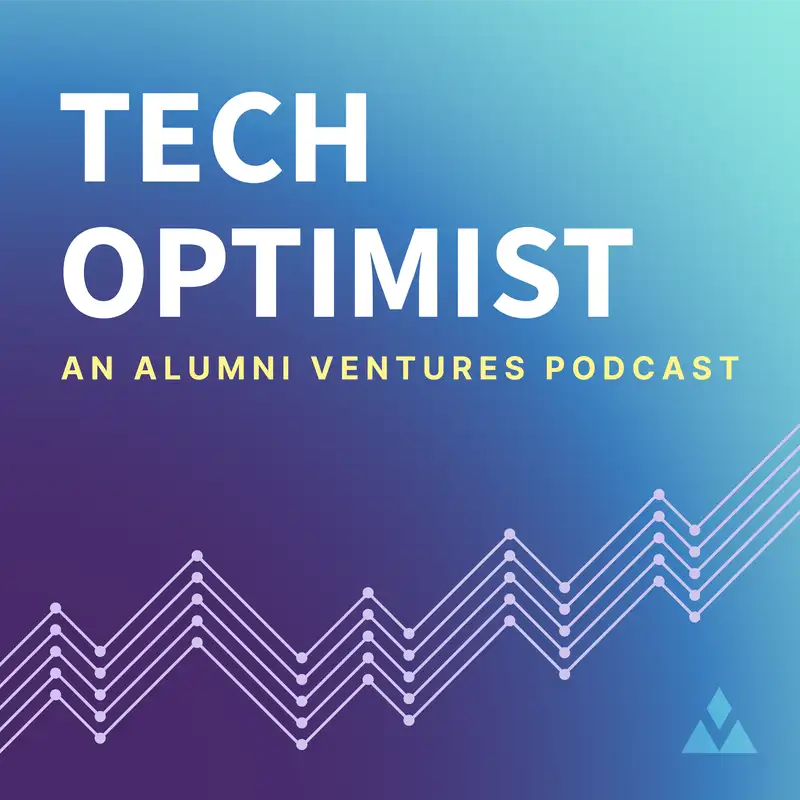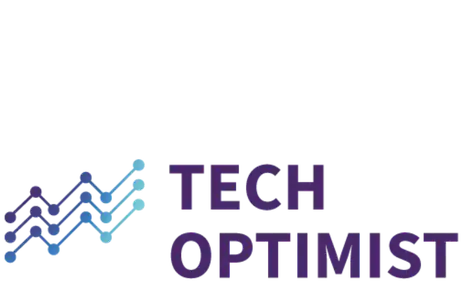#60 - Meet the Start-Up Focused on Microbe-Tech
Samantha Herrick:
Ever wondered what it was like to design products using microbes? Let's find out.
Cheri Ackerman:
In the long term, we're super excited about being a company that catalyzes people having access to products that use microbes to our benefit in a way that just hasn't been possible before.
Drew Wandzilak:
Let's stop trying to reject the things that exist at a very molecular microbial biological level, and how can we leverage them to get outcomes that we want?
Cheri Ackerman:
Starting to build medicine that is based on ecosystems.
Samantha Herrick:
Welcome back to the podcast, everyone. This is The Tech Optimist. Today, we have a Meet the Startup episode for you today, and the startup we're going to talk to is Concerto Biosciences.
Now, behind the ball, behind the plate for AV is Drew Wandzilak, Senior Associate here at Alumni Ventures. You know him, you love him. And then, our guest is Cheri Ackerman, co-founder and CEO of Concerto Biosciences. And now you know me, my name is Sam. I'm the guide, editor, and narrative savant for the show. Now, I'm going to help guide you through this episode and get through it.
A little bit about Concerto. Being present within the biological biotech mecca in this country, up in the northeast out of Cambridge, Massachusetts, Concerto Biosciences has a really cool tagline. Microbes like humans are stronger together than they could ever be alone. I'm not going to spoil too much of their technology, but essentially what they do is they produce a arrays of microbes and combine a bunch of them together in a bunch of different combinations, millions and trillions of combinations, and they try to see if those combinations can assist in product development. Products such in this realm of skincare, women's health, agricultural, oral and gut health, animal health, built environment.
Drew does a really good job of walking Cheri through their technology, and I help and bring some fascinating facts along the way, but I'm going to stop yapping and let's hop to the episode. Enjoy.
As a reminder, the Tech Optimist podcast is for the informational purposes only. It's not personalized advice, and it's not an offer to buy or sell securities for additional important details, please see the text description accompanying this episode.
Drew Wandzilak:
Fantastic. Okay, great. That was awesome. Let's jump into, really, the bulk of the conversation here. Starting off, introduce yourself, introduce the company, and we'll go from there.
Cheri Ackerman:
Sure. My name is Cheri Ackerman. I'm the CEO and one of the co-founders of Concerto Biosciences. My background is pretty scientific. I did a PhD in chemistry at UC Berkeley. Then I came to MIT to do a postdoc in biological engineering. I worked with Paul Blainey's group at the Broad Institute, and Concerto ultimately flowed out of technology that we invented while we were there, myself and my co-founding team.
What we do as a company is we are trying to make it possible to tap into the microbial world. We think that this is one of the under accessed natural resources in the world around us. Microbes are literally everywhere. They grow on every surface, and that includes our bodies, plants, the soil, our buildings, and yet you go to the store and what products can we actually use or access or rely on to change the microbes that are around us in a way that would benefit us? And the answer is honestly not very many, and most of the technologies that we have are designed to kill microbes. There are things like antibiotics and bleach and soap and hand sanitizer, things like that.
Then this begs the question, why? What has been so hard about harnessing these microbes that are literally everywhere, and we know they're very important for shaping our immune system, our nutrition, the types of infections that we do or don't get? We would argue that a big reason for that is that even though microbes in real life live in these very complex ecosystems, the way that we tend to study microbes in the lab is one by one, so we get very incomplete information on how microbes actually work.
Then when people develop products based on lab research, they try to move those products out into the real world, those products break. And then, we have people who say, "Oh, the microbiome doesn't work," or, "Synthetic biology is really hard." Yes, it's really hard, and part of the reason is because we don't understand how microbial ecosystems work. The technology I mentioned, we spun out from MIT and the Broad Institute, the technology that we invented while we were there, it's called kChip. It basically lets us take a library of different types of microbes, different individual microbes, and mix and match them and make all the different combinations of those microbes and then measure. How does this combination work? How does that combination work? How does the next combination work, on the order of tens of millions to hundreds of millions of at a time? And that is the type of scale that you actually need if you want to explore what we call combinatorial space where you have all these different combinations.
And then, once you have that kind of data, obviously, you can apply AI and start to make models of how does a microbial ecosystem actually function? If I can measure maybe 10% of how that ecosystem works, then I can use the model to expand to the rest of how the ecosystem works. Once we understand how an ecosystem works, then we want to build products that actually take advantage of all of that understanding. And so, we've been working on atopic dermatitis, or eczema is a very more common name for it. It's a condition that has a lot of different contributing factors, and one of them from the clinical research, seems to be the skin microbiome. There's a microbe called staph aureus that grows on the surface of skin, and when it starts growing out of control, it actually degrades the skin barrier and can trigger eczema flares.
And so, what we did was we basically figured out how the skin microbiome influences staph aureus' behavior. We found a collection of three microbes that when you put them onto a skin model, they pacify staph aureus. They keep it under control. And so, now we're starting a clinical trial right now to put these microbes onto people and see on an actual person with atopic dermatitis, do these microbes also control staph aureus, and then does that help with atopic dermatitis?
We also have a product that we're working on for recurrent vaginal yeast infection. One-off vaginal yeast infection, no big deal. Take fluconazole, it goes away. But there are about a million and a half women in the US who get four or more yeast infections a year, and then they just end up on these azole drugs all the time. They have nasty side effects. You can't use them if you're trying to get pregnant or you are pregnant. We feel like there's a lot of white space here, especially because microbes are so clearly the underlying problem in this situation. If we could rebalance the vaginal microflora in a way that would keep Candida under control again, then that would be a very viable solution.
You can imagine tons of different applications across cosmetics and food ingredients and agriculture, all different kinds of areas. And so, in the long term, we're super excited about being a company that catalyzes people having access to products that use microbes to our benefit in a way that just hasn't been possible before.
Samantha Herrick:
All right. Here's my first interjection for this episode. Cheri already has done a really good job of explaining to us what microbes are and how they are a part of our everyday life, how they live with us, how they live on us, and how they affect just our bodies in general. But there's a little bit more information on some microbes that I want to share.
It turns out there are a bunch of different types of microbes. Some different types are bacteria, fungi, viruses, protozoa, algae, archaea, and prions. Now I want to talk about why they're important. We're going to get into that a little bit further in this episode, but just to get us a general education before we hop into the specifics later.
Ecosystem functioning, they contribute to nutrient cycling, decomposition and energy flow within ecosystems. Human health, the human body hosts trillions of microbes that aid in digestion, protect against pathogens and support immune function. The balance of these microbial communities is crucial for maintaining health as we'll find out more. And the coolest one, biotechnology. Microbes are utilized in various industries for fermentation. For example, bread and beer production, bioremediation, cleaning up pollutants, and even pharmaceuticals like antibiotics.
All right. We are going to take a second and hop into a quick ad and then I promise we'll be back into the interview. Hang tight. Don't go anywhere, we'll be right back.
Pete Mathias:
Hey, everyone. Just taking a quick break so we can tell you about the US Strategic Tech Fund from Alumni Ventures. AV is one of the only VC firms focused on making venture capital accessible to individual investors like you. In fact, AV is one of the most active and best performing VCs in the us, and we co-invest alongside renowned lead investors. With AV's US strategic Tech Fund, you'd have access to an investment portfolio focused on technologies that are critical to bolstering US national security and economic prosperity.
We prioritize three key areas, homeland security, Cyber AI and digital strategy, and space innovation. By investing in companies innovating in these areas, you can support early stage ventures and help encourage sustained growth and technological progress in the United States. If you're interested in learning more, visit av.vc/funds/strategictech.
Drew Wandzilak:
Tremendously helpful, and we'll will get back to clinical trials and the combinatorial space and all the great things that you just mentioned. I think to make things very real and simple, maybe at the risk of losing some of the important nuance here, why these microbial ecosystems, and maybe through the lens of eczema or whatever makes the most sense, versus our existing ways that we treat what's happening and why is it important?
Cheri Ackerman:
Sure. Yeah, right.
Drew Wandzilak:
I can get why you guys are... How you're able to harness these microbes, but what are the benefits of doing that compared to what exists today?
Cheri Ackerman:
Yeah, I will. I'll just use atopic dermatitis as a very concrete example of this. A lot of the different things that contribute to eczema are things like the skin barrier degrading and the immune system becoming overactive in some way. One of the interesting things about the immune system is it's always interfacing with our external world. Well, our external world is covered in microbes, so understanding which microbes are contributing to a positive immune response, a negative immune response, basically creating a microbial environment that will allow the immune system to calm down has been the holy grail for microbial science for a while now, I would say.
The angle that Concerto is actually taking is not necessarily trying to interface with the immune system because I think that still is very difficult science. Instead, we chose to go after a very specific microbe that has been shown to trigger these flares. Right now, your options, if you want to try to address this component of atopic dermatitis, it would be take an antibiotic or smear a topical antibiotic on skin. You can't use antibiotics for more than a couple of weeks because they mess up your gut microbiome and they mess up the rest of your skin microbiome, so it's not actually a viable solution. Plus if you just knock out staph aureus and then you take the antibiotic away, you've left this giant ecological niche and guess who's going to grow back the fastest to refill that niche? Staph aureus.
Antibiotics I think are really good for treating acute infection. They're really bad if what you're dealing with is some kind of microbial imbalance or something that's more chronic where you can knock it down, but it's going to come right back. If you're in that kind of situation, then what you need is something that's going to reclaim the niche and something that's actually going to shift the way that the microbiome works.
I think that what we're developing is very complementary to what's already out there. Would it be helpful to calm your immune system down while we're trying to rebalance the microbiome? Absolutely. And so, would we expect people to just prescribe ensemble number two, which is our eczema therapy? Honestly, probably not because most dermatologists already are prescribing multiple things for AD. But ultimately, I think it's another handle and something that really has not been tapped into yet. It's extremely safe. Unlike messing around with your immune system, which can have all kinds of side effects, you're taking some microbes from healthy people and you're putting them onto another person. Those microbes are designed or evolved to live there. Super safe and I think can complement the existing set of therapies.
Drew Wandzilak:
Complement, and maybe not as radical as I'm going to make it sound, but a pretty big shift in how we think about microbes and what you guys are doing.
Cheri Ackerman:
Yeah.
Drew Wandzilak:
And it's similar, again, I might lose a little bit of nuance here, but something that we see across biotech life science more broadly is starting to tap into things that previously seemed to be enemies, like parts of our body and parts of our world that for decades we were like, "How do we get rid of this?" And I think now, and I'd love to get your thoughts on this, there seems to be a little bit of a reframing of let's stop trying to reject the things that exist at a very molecular microbial biological level and how can we leverage them? Again, I might be a decade late to this, but how can we leverage them to get outcomes that we want? I'm curious if that's totally out of left field or if you're seeing a similar thing or I'm just very late to the party.
Cheri Ackerman:
Probably none of the above, I think. One of my co-founders, Jared Kehe, who invented the chip that we use, this is his driving motivation for starting Concerto was we have this very binary way of thinking about microbes, either they're good for us or they're bad for us, and mostly they're bad for us. That's not really how microbes exist in the world. So fun fact, 30% of women have Candida albicans, the thing that causes yeast infections, just living in their vaginal canal. No big deal. They don't get infections. Why? That's very strange, and this is actually true of staph aureus too. It can exist on skin and be completely fine. There's something about opportunism, the context being very important for how these microbes behave. We don't just see it in the microbiome, we also see it in things like cancer, where cancer can kind of sit there and look at you for a while and not actually be a huge problem until suddenly it is a huge problem. And what is it that causes these shifts?
The thing that got me very excited about starting Concerto is the idea of starting to build medicine that is based on ecosystems. Viewing the body as an ecosystem instead of viewing our bodies as mostly fine except for one broken protein or mostly fine except for one out of control microbe. That's not really what's going on. It's a very interconnected system and the ecosystems of microbes that live on us are just one area where we can start to create ecology-based medicine. And then, if we can show that it's possible there, then where else might we be able to apply these kinds of principles? And I think cancer, immunity, autoimmunity, allergy are all areas where it'll be really interesting to see what kinds of therapies end up being effective in the future.
Drew Wandzilak:
I love the perspective of, and I'll ask after why the name Concerto, because I think it's very relevant to what we're talking about right now, which makes a ton of sense, is just thinking about these things as ecologies as systems, and whether it's like polypharmacology or combinatorial space or whatever it is, thinking about how can we interact with one thing and understand how that is going to impact another thing. How can we get this certain reaction but also suppress or enhance a reaction that hits something else?
Hopefully, that lays the found work for a world where we can treat things and not necessarily have the long list of side effects. Again, that might be an oversimplification, but I just love that perspective and it sounds like that's obviously core to how you guys think about building Concerto. Why the name Concerto?
Cheri Ackerman:
Sure. For those who might be listening and don't know, a concerto is a piece of music where there's some central player. A violin concerto has a violinist that does a significant solo at some point in the piece. And that piece that the violinist is playing, that melody, is then supported by the entire orchestra that is around them. And so, the way that we think about this in the products that we make is that we are looking for combinations of microbes that are good, we literally call them ensembles, that are good ensembles to support some central function that we're trying to give to the person or the plant or the soil or whatever. And so, this idea of multiple microbes coming together to support some central function or some other central microbe maybe that we're trying to promote is how we got the name.
Samantha Herrick:
All right. I did a dive on concertobio.com/company and I'm going to talk about their mission and values as a company. Their mission, this is straight from their website, we create safe, effective microbial products for our world. First came antibiotics, then came genetic engineering, Concerto was catalyzing a third wave of microbial technologies to capture what microbes do best, protect the health of our bodies, our food and our planet. Accessing these microbial ecologically inspired products requires rigorous discovery science, a strong collaborative culture and an unwielding commitment to improvement.
Now, their values as a company, they want to grow by experimenting. They want to work rigorously, they want to listen intently, they want to act with compassion. And they also have a tagline at the end of this page that says harness microbial ecology with Concerto to develop new transformative products, which I really liked a lot.
Now, I want to talk a little bit more about their kChip discovery engine, which Cheri talked about before, but the way that they wrote about it on their website is really concise and I want to share to even get a whole another layer of understanding for everyone who's listening. We power microbial product discovery, a singularly powerful and versatile technology, kChip leverages miniaturization and random self-assembly to construct and measure millions of defined microbial combinations simultaneously. I have a really cool imagery behind this, it kind of looks like colorful stoplights, which I'm going to throw up right now as well. I think it's a really cool image.
What it does? We solve the N choose K problem. The math is complicated. So kChip takes it in stride, starting from a collection of blank microbes, kChip physically constructs K blank, maybe two way combinations to produce a total of said co-cultures to unveil the hidden ecology of each microbiome.
Now, we're going to talk a little bit about how it works. The complexity of microbial ecology. Microbes all around us work in concept to improve human health, enhance food quality and boost crop yield. Designing products that recreate these capabilities requires an unprecedented understanding of how microbes behave together. Separated, recombined and measured, the kChip physically constructs millions of miniature microbial communities by combinatorially recombining a library of microbes and/or environmental factors to generate massive data sets. By observing each constructed community, we identify key ecological ingredients, microbes, prebiotics, and postbiotics that drive the beneficial capabilities of natural communities that then reveal previously inaccessible products.
The possibilities of bigger than we are so we engage with co-discovery partners in biotech and biopharma to unleash a new area of microbial research and a treasure trove of microbe-based products. Okay, let's hop back in.
Drew Wandzilak:
Fantastic. And then, I appreciate when you talk about the future of the business, very long term. I mean, there's things that are in clinical trials now and there's applications for how you guys are thinking about these things for, you mentioned topical treatments, food, just a million different industries.
What's your pie in the sky? Maybe not pie in the sky, but your long term, and maybe it's 30 years from now, but it's Concerto did X. Whether that's an industry, an application you already have in mind, a specific treatment or whatever it is. What do you kind of think about, because I know you're thinking about it? I know there's moments maybe in the brief periods between all the other stuff that you have to do where you're like, "At some point, I think this technology could do this."
Cheri Ackerman:
I think I will be a little disappointed if all Concerto does is one X. For example, if all we do is create a game-changing therapeutic for atopic dermatitis, no offense to all the people with eczema, I know it's a huge frustration and we want to deal with it. Also, I feel like there's just so much more that microbes can do for our world, for our health, for our environment, that what I would love to see, and this is not a five-year vision, this is 30, 50 year vision, would be for Concerto to have the same kind of reputation as say Intel or this idea that where you have Intel inside of literally everything and everybody's computers work and everybody's phones work because of Intel. This idea that there's a whole new class of product that exists because Concerto was able to understand how microbial ecosystems work and suddenly we actually interface with our worlds completely differently and that changes the way that we practice medicine.
I mean, imagine a world in which for a basic ear infection or a basic sinus infection, you don't get an antibiotic, you get a microbial cocktail that takes care of the infection, rebalances it. You don't get recurrent ear infections anymore and you don't have all the damage to your gut microbiome. There's just a completely different paradigm of a world we could live in.
And this could be true, I mean, think about the use of antimicrobials across the meat industry and in agriculture like antifungals and pesticides, things like that, that we don't actually need those. I think that there's just that sort of frame shift of microbes work for us, not against us. We know how to harness them, and we only use chemical interventions when it comes to microbes when we actually need to, when we have a bloodstream infection or something. And then, we're not stuck in this horrific war of antimicrobial resistance popping up all the time. This idea that we could come up with a completely new class of product and Concerto would be a household name that made that class of product possible.
Drew Wandzilak:
I think that's just an incredible framing. It really is this infrastructure and have the little Concerto logo on the-
Cheri Ackerman:
Yeah, on everything.
Drew Wandzilak:
... Bottom of every product out there that you'd buy, I think is an incredible vision and we're excited for it. Coming back, that's like long-term, and then I promised I'd bring it back to the existing clinical trials. Give us a better sense of where you guys are at now. It sounds like two things in the pipeline, where those are at. And let's give a little something because we had a little dig towards the people with eczema out in the audience, so give them a little something. If this works, what's a realistic timeline for when I can start changing how I think about my eczema?
Cheri Ackerman:
Yeah. Well, it is going through FDA pathways, and so we absolutely respect the FDA and everything that the FDA does for us in terms of giving us medicines that are safe and effective. That also means that there is a lot of testing that has to be done to make sure that, just because we think it's safe, is it actually safe? Just because we think it's going to help, does it actually help, and making sure that that's true from a statistical point of view?
Where we are right now is very, very early stages. It's just going on to people for the first time. It's a phase one trial. It's a 1B, so it's being done in patients with atopic dermatitis so that we can actually measure what happens to their AD. But then after that, we would need to do a phase two trial and then a couple of phase three trials. That timeline, usually a phase two trial is something on the order of two to three years, and then you can run your phase three trials in parallel, but again, you're talking another two to three years. And then, the biologic license application, BLA process, which is the equivalent of a new drug application but for a biologic, that process takes about a year. We're talking the fastest, if we sprint, is maybe six or seven years, and things can happen along the way that might make that take longer.
That said, this is the process for every single drug. I truly believe it is worth it in the sense that we get drugs that are very high quality that we can rely on to actually do the things that we need them to do for us. And if we're going to develop a drug out of microbes, we certainly want that drug also to be highly efficacious.
Drew Wandzilak:
I completely agree. I mean, I think it's beyond just the peace of mind of knowing that all drugs and treatments in the market went through this very rigorous and thoughtful process. We love and appreciate the FDA. And that will lead into my next question of when you think about challenges moving forward, or even just barriers, maybe it's not things that don't have an answer to them, but just things that hold up the development of the business. Are they regulatory? Is it science? Is it technical? Is it people? Is it market? I mean, how do you think about the upcoming barriers? Sounds like these timelines, some of them are, delayed is the wrong word, but delayed because there's this regulatory framework which is passive.
Cheri Ackerman:
They just are.
Drew Wandzilak:
It's just are.
Cheri Ackerman:
They're not delayed, they're just long.
Drew Wandzilak:
Yeah, it's just long. It's just long. It's a long timeline.
Cheri Ackerman:
Everybody in Boston biotech, all biotech, where they're just long.
Drew Wandzilak:
But you see that as the main inhibiting factor?
Cheri Ackerman:
No.
Drew Wandzilak:
Or no, okay.
Cheri Ackerman:
No, I mean, I think... The atopic dermatitis market today is booming. The number of drugs that are coming onto the market right now is kind of insane.
Samantha Herrick:
Okay, one more add, I promise we'll be right back. Don't go anywhere.
Speaker 5:
Do you have a venture capital portfolio of cutting edge startups? Without one, you could be missing out on enormous value creation and a more diversified personal portfolio. Alumni Ventures, ranked a top 20 VC firm by CB Insights, is the leading VC firm for individual investors. Believe in investing in innovation, visit av.vc/foundation to get started.
Cheri Ackerman:
The amount of competition that we're facing, that might be an interesting... If it turns out that there is a drug that works in the vast majority of patients, which I would argue based on the data today, there's really not, that could be a source, a significant headwind for us.
I actually think the biggest headwind right now is dealing with the hype trough that the microbiome is in. Microbiome was super, super hot in the early 2010s, and then a whole bunch of large companies got formed with hundreds of millions of dollars of capital, and they made incredible progress in the field. When you look at the work that was done to educate the FDA, FDA is used to dealing with, we have a small molecule or an antibody that's going to hit this protein and we want to understand that interaction and we want to do tox data and all of that kind of stuff. None of that works in the microbiome space. Those early companies did all of the work to talk with the FDA about how do we think about microbial interventions? What do terms like PKPD, pharmacokinetics, pharmacodynamics, do they apply or do they not apply?
They made a ton of progress on infrastructure, things like how do you produce a microbial intervention such that the FDA believes that it is produced in a safe GMP, good manufacturing practices sort of way. And then, a lot of them failed. They did a ton of good work for the industry and then had some pretty bad clinical trial results. A whole lot of companies have gone under, especially in the 2022/2023 slump. It is rough to be a company that works on microbial interventions, especially because pharma right now is kind of like, "Okay, you guys work it out and we'll be here when you get done and you tell us which things worked and which things didn't work." Most pharmaceutical companies have closed down their microbiome arms. There's not a lot that we can do about that. I would say it's actually on the market side and the hype cycle side that makes it the hardest right now.
Drew Wandzilak:
Okay. I was almost going to end there, but I feel like that's a very somehow negative note to end on.
Cheri Ackerman:
Too negative, yeah.
Drew Wandzilak:
So respond to that, as one of the founders of Concerto. I mean, if pharma's pulling away a little bit, there was kind of this downturn, we're in this trough, why should people be excited about Concerto? I mean, at a high level, but just the actual, what's different than the negative signals of a decade ago, a couple of years ago?
Cheri Ackerman:
A couple of reasons I think are quite compelling. One is that microbial products are inevitable. We're going to live in a world where it is possible to use the microbes around us to our benefit because they are there and we know that they influence us and being able to reliably control them in a way that's beneficial to us, that's going to unlock billions of dollars of value. Somebody's going to do it.
Then the question is, is Concerto to the company that's going to do it? Well, part of why we built kChip in the first place was because we felt like the data sets that the original microbiome companies were working with were quite limited. They're working with those older ways of looking at microbial populations where we're making lists of microbes and healthy people, sick people, compare those lists and try to correlate microbes to health or disease without a terribly deep understanding of this is why this microbe would create health for this person.
A lot of the studies that were done in the 2010s were based on these correlations and associations and then that didn't turn out to be causation. And everyone was like, "Well, yeah, because correlation and causation are not the same thing," and that's okay. I think it's worth going after a technology when it's still V1. But what Concerto is building is not V1. We are working, expressly working, only in areas where there is some underlying knowledge of the biochemistry, the microbiology, what's going on?
When I say that staph aureus is known to grow on the surface of skin and it grows out of control and that triggers these flares, we actually know the different proteins that staph aureus expresses that cause these problems. Concerto has very specific targets to go after in a way that microbiome companies from 10 years ago didn't have those particular targets or they were working in areas where those targets weren't available, and in some cases still aren't available. I think the science is a lot more mature now, and Concerto has a data set through kChip that lets us understand the microbiome in a completely different way.
And the last thing I'll say is another good reason to bet on a company that is now one of a very few number of companies that's working in a space is because it means that the field is wide open for us. Who's going to catch up at this point? If we can keep the lead, then Concerto is in a really good space to actually dominate this as opposed to having a lot of other companies around that we would have to compete with.
Drew Wandzilak:
Well, we are certainly excited, and I think the parting question is hopefully people listen to us and they're excited about this new microbial world and they're excited about Concerto, to our community of 700,000 people plus across all walks of life in society, what can people do to help? This is a very kind of abstract question maybe, but I mean just a random Joe Schmo, what should he do if he's like, "I love Cheri and I love Concerto. What can I do?" Aside from money.
Cheri Ackerman:
I was just going to say this is not a random Joe Schmo, this is cash, any cash, but that's, you know. I think things... Minimum bar, follow us on LinkedIn and promote what we're doing and stay engaged with the microbiome world. Talk about us with your friends. That's very helpful. I think another thing is figure out from your networks who it is that wishes that they could incorporate better science behind micro based products.
We're testing a hypothesis right now that microbial ingredients can be differentiating in the CPG, the consumer product and goods space, versus there are a lot of standard functional ingredients that I would argue are getting stale in CPG space. These are things like zinc being used for dandruff and benzoyl peroxide being used for acne. These ingredients are a dime a dozen at CVS, and we think brands are looking for ways of differentiating, and we think that microbial ingredients can be part of that differentiation. If you want to help me test that hypothesis and you know people who would want to talk about that, that's an area that we're actively exploring right now.
Drew Wandzilak:
Love it. Like, comment, subscribe, follow Concerto on every platform. You guys do a great job of, I think, being pretty transparent as you can be and promoting stuff that you guys are doing in a way that I have-
Cheri Ackerman:
Yeah, we have great content. Follow us on LinkedIn. Really great content.
Drew Wandzilak:
Great content. No, seriously, I'm hyping you guys up. But I'm not a scientist by trade and I've really enjoyed, I think, the learnings and just the excitement that comes through.
Cheri Ackerman:
Thanks.
Drew Wandzilak:
It's been a fun follow. Well, fantastic. Cheri, thank you so much for joining us.
Cheri Ackerman:
Yeah, truly my pleasure to be here.
Drew Wandzilak:
Yeah, that was fantastic and a ton of fun. We really appreciate it and best of luck. We'll talk soon.
Cheri Ackerman:
Thanks. Awesome.
Samantha Herrick:
Thanks again for tuning into The Tech Optimist. If you enjoyed this episode, we'd really appreciate it if you'd give us a rating on whichever podcast app you're using and remember to subscribe to keep up with each episode. The Tech Optimist welcomes any questions, comments, or segment suggestions. Please email us at info@techoptimist.vc with any of those and be sure to visit our website at av.vc. As always, keep building.








